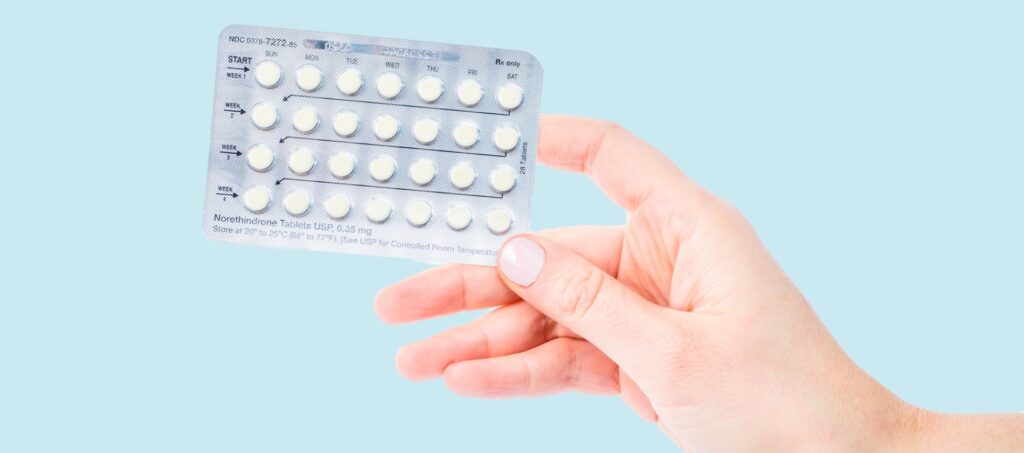Estrogen and Birth Control Pills
The birth control pill is 99% effective with perfect use, which makes it one of the most popular options for contraceptives. However, some women don’t realize that all birth control pills are not alike. In fact, the makeup of the pills you take can determine what types of side effects and benefits you experience.
Do you know how much estrogen is in your birth control pills? Learn more about how hormones prevent pregnancy and the pill options according to hormone content.
Hormonal Contraceptives
The two hormones used in most birth control pills are estrogen and progestin. When combined with progestin, estrogen is able to prevent ovulation to reduce the risk of pregnancy. These hormones also thicken the mucus around the cervix, which makes it more difficult for sperm to enter the uterus, and thin the lining of the uterus so that an egg will be unable to attach to the uterine wall.
Birth control from Nurx costs as little as $0 with insurance or $15 per month without insurance.
With all three of these actions occurring within the body, there’s almost no chance for a woman to become pregnant. Taking the pill on time each day is critical for the hormones to be effective.
Pill Estrogen Levels
There are three types of birth control pills. The main difference between these pill types is the amount of estrogen included in each one.
- Combination pills: Combination pills like Lutera contain both estrogen and progestin. This is the most popular and most common type of birth control pill. The combination of hormones in this pill can positively impact a woman’s menstrual cycle as well as her overall health. Combination pills typically contain 30 to 50 micrograms of estrogen.
- Low-dose pills: Low-dose pills like Lo Loestrin Fe also contain both estrogen and progestin, but in significantly smaller amounts than combination pills. Birth control pills with 20 micrograms of estrogen or less are considered low-dose pills. This type of pill is recommended for women who are sensitive to the side effects of higher estrogen levels, such as nausea or mood changes.
- Mini-pills: Need to avoid estrogen entirely? Mini-pills like Camila contain only progestin. This estrogen-free option is recommended for breastfeeding and recent postpartum moms, smokers over the age of 35, and women who get migraines with aura. It’s generally safe for use by women who should not take pills containing estrogen for health reasons like high blood pressure or an increased risk for stroke, heart disease, or blood clots. Note: When taking progestin-only pills it’s especially important to take them every day, at the same time of day, for them to be effective.
Estrogen Benefits
Birth control containing estrogen offers some key health benefits, and that’s why most women are prescribed a combination pill containing both estrogen and progestin, unless there is a health reason for them to avoid estrogen. The following are some key advantages of taking birth control containing estrogen:
- Lighter and shorter periods
- More regular periods
- Reduced menstrual pain
- Fewer and less severe menstrual cramps
- Treatment of acne
- Reduced risk of ovarian and endometrial cancer
- Reduced risk of pelvic inflammatory disease (PID), noncancerous ovarian cysts, and iron-deficiency anemia
Many women start taking the pill due to these benefits rather than solely for pregnancy prevention.
But if you start taking the combination pill and experience strong estrogen side effects (see below), your doctor may recommend low-dose pills instead. The low-dose pill can still provide some of the benefits of estrogen, but with less noticeable side effects.
Estrogen Side Effects
Today’s birth control pills contain lower levels of estrogen than in the past. This has contributed to fewer side effects and health risks associated with taking the pill. As with most types of birth control, there are still some side effects that may occur, especially in women who are sensitive to estrogen. In some cases, taking birth control pills containing estrogen could lead to some of the following symptoms:
- Weight gain
- Headaches
- Mood changes
- Irregular menstrual bleeding
- Breast tenderness
- Nausea
- Dizziness
- Acne
- Decreased sex drive
As with most forms of birth control, there are some potential health risks you should be aware of. The estrogen in birth control pills can increase the risk of the following conditions:
- Blood clots
- Heart attack
- High blood pressure
- Stroke
It’s important to note that the risk for the side effects and medical concerns listed above is minimal. It is very rare for a woman to develop a serious health condition as a result of taking birth control pills.
If you experience significant side effects or other health concerns after taking the birth control pill, be sure to talk to your doctor. Since combination pills have the highest level of estrogen, switching to a low-dose pill or mini-pill could alleviate some of the side effects.
Not sure which pill is right for you? Nurx can help by putting you in touch with a medical provider who can discuss your birth control options based on your unique needs. Be sure to consider any health risks and your sensitivity to estrogen when deciding which type of birth control pill, patch, shot, or IUD to use.
This blog provides information about telemedicine, health and related subjects. The blog content and any linked materials herein are not intended to be, and should not be construed as a substitute for, medical or healthcare advice, diagnosis or treatment. Any reader or person with a medical concern should consult with an appropriately-licensed physician or other healthcare provider. This blog is provided purely for informational purposes. The views expressed herein are not sponsored by and do not represent the opinions of Nurx™.



